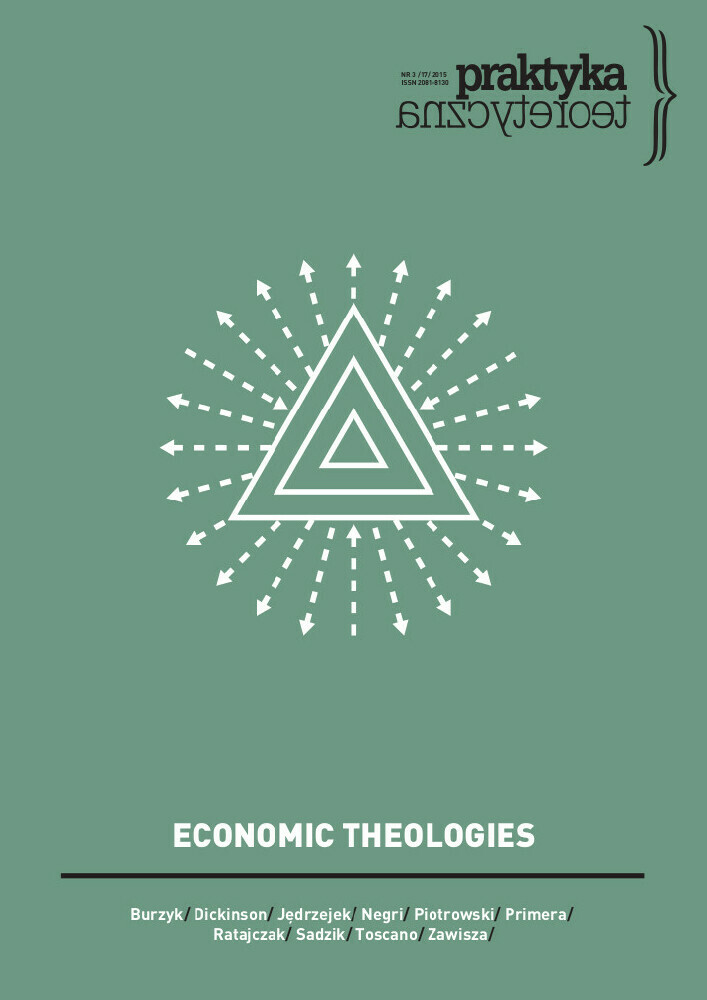Abstrakt
W niniejszym tekście przyglądam się dostrzeżonemu przez Michela Foucaulta przeciwieństwu między teologicznymi obszarami władzy pastoralnej oraz mistycznej, by wskazać na nacisk, jaki filozof kładł na konieczność i opatrzność jako pojęcia założycielskie i legitymizujące Państwo. Dzięki temu rozwijam analizę tego, jak Foucault, krytykując historyczne wykorzystania teologii w roli narzędzia władzy pastoralnej, faktycznie wskazuje na rodzaj teologii politycznej odmiennej od tej stworzonej przez Carla Schmitta. Twierdzę, że zaczynamy zauważać odmienny „typ” teologii politycznej w pismach Giorgia Agambena, który podąża za tradycjami chrześcijańskimi znacznie bardziej niż Foucault. Moim zdaniem przeformułowanie teologii politycznej w dziele Agambena ma kolosalne znaczenie dla całego pola badawczego jako całości i pilnie domaga się dalszego opracowania, na co niniejszy esej zaledwie wskazuje.Bibliografia
Adorno, Theodor W. 1973. Negative Dialectics. Trans. Ernst Basch Ashton. London: Continuum.
Agamben, Giorgio. 1993. The Coming Community. Trans. Michael Hardt. Minneapolis: University of Minnesota Press.
Agamben, Giorgio. 2000. “Absolute Immanence.” In Agamben, Giorgio. Potentialities: Collected Essays in Philosophy. Trans. Daniel Heller-Roazen. Stanford: Stanford University Press.
Agamben, Giorgio. 2004. The Open: Man and Animal. Trans. Kevin Attell. Stanford: Stanford University Press.
Agamben, Giorgio. 2005. The Time that Remains: A Commentary on the Letter to the Romans. Trans. Patricia Dailey. Stanford: Stanford University Press.
Agamben, Giorgio. 2010. Nudities. Trans. David Kishik, Stefan Pedatella. Stanford: Stanford University Press.
Agamben, Giorgio. 2011. The Kingdom and the Glory: For a Theological Genealogy of Economy and Government (Homo Sacer II, 2). Trans. Lorenzo Chiesa, Matteo Mandarini. Stanford: Stanford University Press.
Agamben, Giorgio. 2013. The Highest Poverty: Monastic Rules and Form-of-Life. Trans. Adam Kotsko. Stanford: Stanford University Press.
duBois, Paige. 1991. Torture and Truth. New York: Routledge.
Bourdieu, Pierre. 1991. Language and Symbolic Power, ed. John B. Thompson. Trans. Matthew Adamson. Cambridge: Harvard University Press.
Carrette, Jeremy R. 2000. Foucault and Religion: Spiritual Corporality and Political Spirituality. London: Routledge.
Congar, Yves. 2011. True and False Reform in the Church. Trans. Paul Philibert. Collegeville: Liturgical Press.
Critchley, Simon. 2012. The Faith of the Faithless: Experiments in Political Theology. London: Verso.
Crockett, Clayton. 2011. Radical Political Theology: Religion and Politics After Liberalism. New York: Columbia University Press.
Derrida, Jacques. 2002. “Force of Law.” In Acts of Religion, ed. Gil Anidjar. Trans. Mary Quaintance. London: Routledge.
Foucault, Michel. 1977. Discipline and Punish: The Birth of the Prison. Trans. Alan Sheridan. New York: Vintage.
Foucault, Michel. 2003. Abnormal: Lectures at the Collège de France, 1974–1975, eds. Valerio Marchetti, Antonella Salomoni. Trans. Graham Burchell. New York: Picador.
Foucault, Michel. 2005. The Hermeneutics of the Subject: Lectures at the Collège de France, 1981–1982, ed. Frédéric Gros. Trans. Graham Burchell. New York: Picador.
Foucault, Michel. 2007. Security, Territory, Population: Lectures at the Collège de France, 1977–1978, ed. Michel Senellart. Trans. Graham Burchell. New York: Picador.
Foucault, Michel. 2011. The Courage of Truth: The Government of the Self and Others II: Lectures at the Collège de France, 1983–1984, ed. Frédéric Gros. Trans. Graham Burchell. New York: Picador.
Foucault, Michel. 2014. On the Government of the Living: Lectures at the Collège de France, 1979–1980, ed. Michel Senellart. Trans. Graham Burchell. New York: Palgrave Macmillan.
Kantorowicz, Ernst H. 1957. The King’s Two Bodies: A Study in Mediaeval Political Theology. Princeton: Princeton University Press.
MacKendrick, Karmen. 2013. Divine Enticement: Theological Seductions. New York: Fordham University Press.
Moltmann, Jürgen. 1993. The Crucified God: The Cross of Christ as the Foundation and Criticism of Christian Theology. Trans. R. A. Wilson, John Bowden. Minneapolis: Fortress Press.
Schmitt, Carl. 2005. Political Theology: Four Chapters on the Concept of Sovereignty. Trans. George Schwab. Chicago: University of Chicago Press.
Scott, Peter and William T. Cavanaugh. 2006. The Blackwell Companion to Political Theology. Oxford: Wiley-Blackwell.
Žižek, Slavoj, Eric Santner and Kenneth Reinhard. 2005. The Neighbor: Three Inquiries in Political Theology. Chicago: University of Chicago Press.
Licencja
Autorzy:
„Praktyka Teoretyczna” jest pismem, które chce realizować idee wolnego dostępu do wiedzy i poszerzania domeny dobra wspólnego. Ma służyć rozwojowi nauki i krytycznej refleksji w Polsce i na świecie w imię idei wolnego dostępu do wiedzy (Open Access). Całe pismo jest udostępniane za darmo w Internecie na warunkach licencji CC-BY-NC-SA (Uznanie autorstwa-Użycie niekomercyjne-Na tych samych warunkach 4.0 Międzynarodowe) w wersji 4.0 (szczegółowe warunki: http://creativecommons.org/licenses/by-nc-sa/4.0/). Artykuły w nim zamieszczone mogą być dowolnie przechowywane, kopiowane, drukowane, rozpowszechniane i wykorzystywane do celów naukowo-dydaktycznych przy zachowaniu warunków licencji. Apelujemy tylko o uznanie autorstwa i podanie źródła w myśl przyjętych w środowisku naukowym standardów.
Nie ma natomiast możliwości komercyjnego wykorzystania zgromadzonych zasobów bez pisemnej zgody wydawcy. Dostęp do czasopisma nie może być dystrybuowany za opłatą czy w jakikolwiek inny sposób limitowany przez inne podmioty.
Autorzy tekstów przyjętych do publikacji w czasopiśmie „Praktyka Teoretyczna” są zobowiązani do wypełnienia, podpisania i odesłania na adres redakcji umowy o udzielenie nieodpłatnej licencji do utworów, z zobowiązaniem do udzielania sublicencji CC [PL.pdf, PL.doc, EN.pdf, EN.doc].
Zgodnie z umową, autorzy tekstów opublikowanych w czasopiśmie „Praktyka Teoretyczna” udzielają wydawcy czasopisma niewyłącznej i nieodpłatnej licencji oraz zezwalają na użycie sublicencji Creative Commons Uznanie autorstwa-Użycie niekomercyjne-Na tych samych warunkach 4.0 Międzynarodowe (CC-BY-NC-SA 4.0).
Autorzy zachowują prawa do dalszego, swobodnego rozporządzania utworem.
Autorzy nadsyłanych artykułów powinni upewnić się, czy wykorzystywane przez nich materiały nie są chronione prawami autorskimi na rzecz innych osób i ponoszą odpowiedzialność za ewentualne uchybienia w tym względzie.
